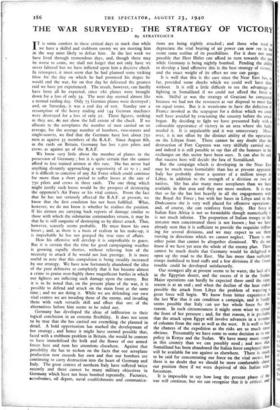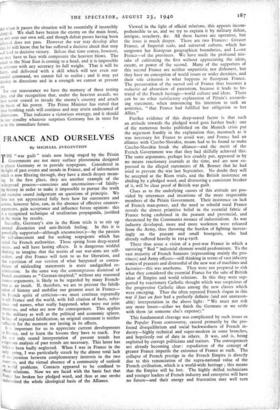THE WAR SURVEYED : THE STRATEGY OF VICTORY
By STRATEGICL S
IT is some comfort in these critical days to mark that while we have a skilful and stubborn enemy we are meeting him in the way most likely to defeat him. In the last week we have lived through tremendous days, and, though there may be worse to come, we shall not forget that not only have we never faltered but we have inflicted upon him a decisive check. In retrospect, it must seem that he had planned some striking blow for the day on which he had promised his dupes he would end the war, for on that day he delivered the greatest raid we have yet experienced. The result, however, can hardly have been all he expected, since 18o planes were brought down for a loss of only 34. The next day seemed almost like a normal raiding day. Only 75 Gernian planes were destroyed ; and, on Saturday, it was a real day of rest. Sunday saw a resumption of the heavy raiding and 144 German machines were destroyed for a loss of only 22. These figures, striking as they are, do not show the full extent of the check. If we allocate to the aeroplanes the number of men carried on an average, for the average number of bombers, two-seaters and single-seaters, we find that the Germans have lost about 750 men as against 35 members of the R.A.F. Since August 8th, in the raids on Britain, Germany has lost 1,500 pilots and crews as against 90 of the R.A.F.
We know very little about the number of planes in the possession of Germany ; but it is quite certain that she cannot afford to lose trained airmen at this rate. She has never had anything distantly approaching a superiority of zo to I ; and it is difficult to conceive of any Air Force which could continue for more than a short period to suffer losses at the rate of 75o pilots and crews in three raids. The one thing which might justify such losses would be the prospect of destroying the opponent's Air Force or his vital centres. From the fact that he has not seriously affected the R.A.F. at present, we know that the first condition has not been fulfilled. What, however, we do not know is whether he realises the position. If his airmen are carrying back reports of damage similar to those with which the submarine commanders return, it may be that he is still sanguine of destroying us by direct attack. That, however, scarcely seems probable. He must know his own losses ; and, as there is a basis of realism in his make-up, it is improbable he has not grasped the true state of affairs.
How his offensive will develop it is unprofitable to guess. But it is certain that the time for good campaigning weather is growing rapidly shorter, without relieving him of the necessity to attack if he would not lose prestige. It is more useful to note that this compulsion is being steadily increased by our strategy. We have now fortunately abandoned the idea of the pure defensive so completely that it has become almost a crime to praise over-highly those magnificent battles in which our fighters are inflicting such damage upon the enemy. But it is to be noted that, on the present plane of the war, it is possible to defend and attack on the main front at the same time ; and we are doing it. While we are defending our own vital centres we are invading those of the enemy, and invading them with such versatile skill and effect that one of the alternatives before him seems to be ruled out.
Germany has developed the ideas of infiltration to their logical conclusion in an extreme flexibility. It does not seem to be true that she has carried out everything she planned in detail. A bold opportunism has marked the development of her strategy , and hence it might have seemed possible that, faced with a stubborn problem in Britain, she would be content to have immobilised the bulk and the flower of our armed forces here and turn her attentions elsewhere. Against that possibility she has to reckon on the facts that our aeroplane production now exceeds her own and that our bombers are continuing to carry destruction into the heart of Germany and Italy. The great centres of northern Italy have suffered twice recently and there cannot be many military objectives in Germany which have not been bombed repeatedly. Factories, aerodromea, oil depots, naval establishments and communica- tions are being nightly attacked ; and those who tend to depreciate the vital bearing of air power can now see in the event some outline of its possibilities. For it does not seem possible that Herr Hitler can afford to turn towards the east while Germany is being nightly bombed. Pending the ability to develop a land offensive this is the best strategy of victors; and the exact weight of its effect no one can gauge.
It is well that this is the case since the Near East has, so far, provided some shocks which we could well have done without. It is still a little difficult to see the advantage of fighting in Somaliland if we could not afford the force to win. Skilful as was the strategy of Graziani he conquered because we had not the resources at our disposal to meet him on equal terms. But it is wearisome to have the defection.of France invoked as the scapegoat for a defeat which we could well have avoided by evacuating the country before the attack began. By deciding to fight we have presented Italy with a colourable appearance of victory in an area where she badly needed it. It is unpalatable and it was unnecessary. More- over, it is not offset by the distinct ability of the operations on the Libyan front. There cannot be any doubt that the destruction of Fort Capuzzo was very skilfully carried out; and indeed it is still possible to say that all the honours in the exchanges on this sector have been ours. It can also be said that success here will decide the fate of Somaliland.
But the campaign which is developing in the Near East may be much more formidable than has at present appeared. Italy has probably about a quarter of a million troops in Libya, in addition to the strength of a division or two of natives. She has also many more aeroplanes than we have available in that area and they are more modern. It is true that so far she has lost heavily in all the engagements with the Royal Air Force ; but with her bases in Libya and in the Dodecanese she is very well placed for offensive operations; and, of course, she can reinforce from Italy. Her force in Italian East Africa is not so formidable though numerically it is not much inferior. The proportion of Italian troops in the 200,000 men concentrated there is not known ; but we have already seen that it is sufficient to provide the requisite stiffen- ing for several divisions, and we may expect to see them moving in directions which we cannot neglect. There is one other point that cannot be altogether dismissed. We do not know if we have yet seen the whole of the enemy plan. There cannot be much doubt that Germany would be delighted to open up the road to the East. She has more than sufficient troops mobilised to lend staffs and a few divisions if the Greek trouble could be developed satisfactorily. Our strongest ally at present seems to be water, the lack of it in the Egyptian desert, and the excess of it in the Sudan. Major operations can hardly be expected there until the rainy season is at an end ; and when the decline of the heat makes possible the attack from Libya the problem of watering a great force will begin. We know from bitter experience is the last War that it can condition a campaign, and it hardly seems possible that Italy can use her whole force for this reason. In such circumstances it might seem wiser to spread the front of her pressure ; and, for that reason, it is probable that the attack upon Egypt will involve advances in a number of columns from the east as well as the west. It is well to face the chances of the expedition as the risks are so much more obvious. Presumably we have come to some decision as to our policy in Kenya and the Sudan. We have many more trooPs in this country than we can possibly need ; and now dig Somaliland has been abandoned the Italian force employed there will be available for use against us elsewhere. There is mudl to be said for concentrating our force on the vital sector, but there is no doubt that we should be more comfortable about our position there if we were deprived of this Italian rein- forcement.
It is impossible to say how long the present phase of the war will continue, but we can recognise that it is critical• and that when it passes the situation will be essentially if insensibly changed. We shall have beaten the enemy on the main front, en and over our own soil, and though defeat passes having been defeated does not pass. However the war may develop after that, he will know that he has suffered a decisive check that may well lead to decisive victory. Before that time comes, however, we may have to face with composure the heaviest blows. The attack in the Near East is coming to a head, and it is impossible to estimate with any accuracy its full weight. That it will be heavy, and delivered 'with a skill which will test even our trusted command, we cannot fail to realise ; and it may yet develop in directions and in a strength we cannot at present see.
For our reassurance we have the memory of these testing days, and the recognition that, under the heaviest assault, we have never ceased to invade the enemy's country and attack the bases of his power. The Prime Minister has stated that these bombing raids will continue and may attain undreamed of dimensions. That indicates a victorious strategy, and it should be our standby whatever surprises Germany has in store for us in the immediate future.































 Previous page
Previous page